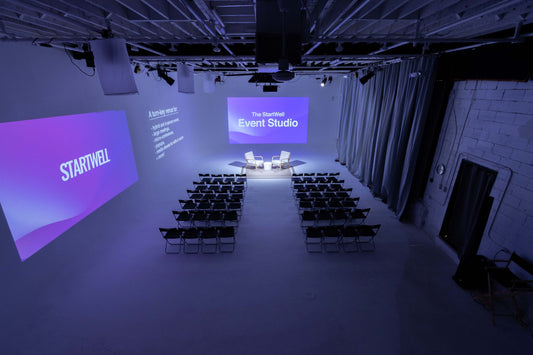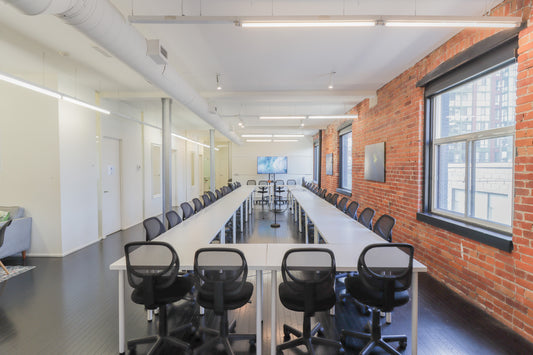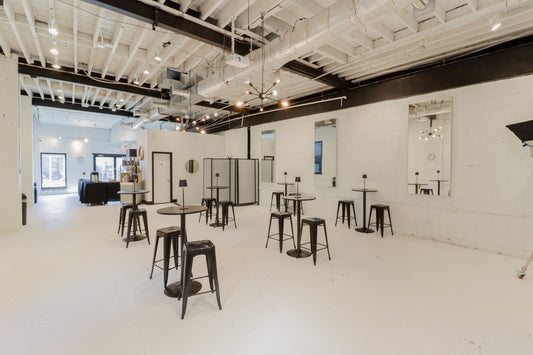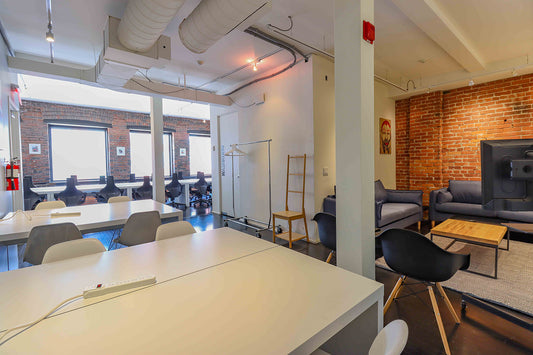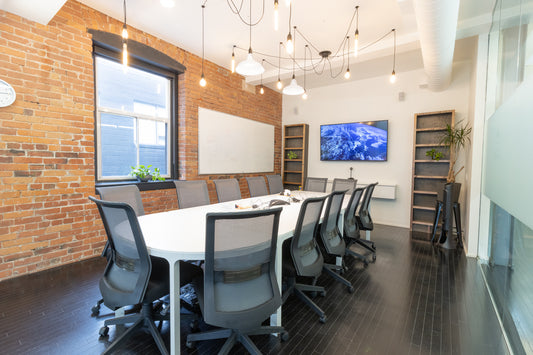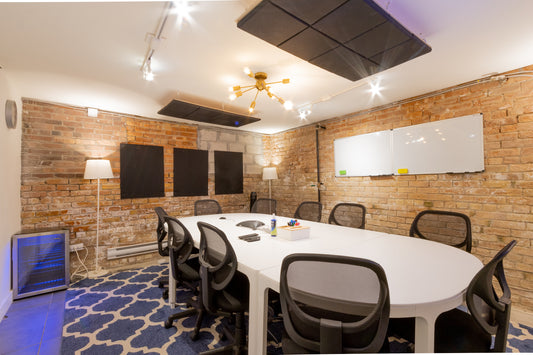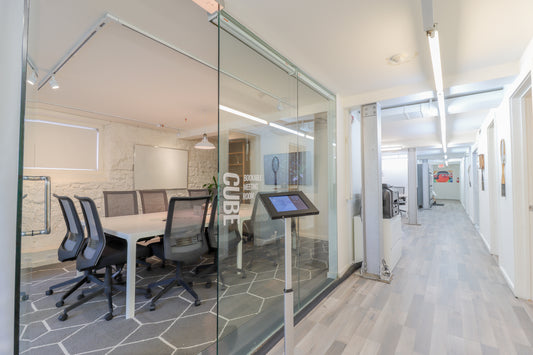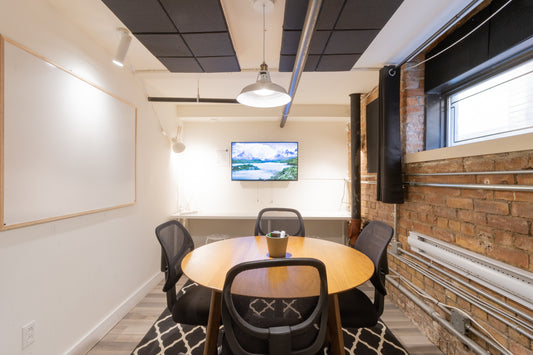For over 30 years Michael Goldman's professional facilitation training and services company has worked to enable more effective and efficient collaboration. In Canada, Facilitation First is a highly respected firm for its practice and network - which has trained over 20,000 certified facilitators.
In this episode of StartWell's Gathering Podcast you'll learn how Michael came to facilitation from the very specialised field of Speech Language Pathology at a time when there were few training manuals or mentors available in the country.
There are a ton of insights in this conversation - one of our favourites is how Michael explains the value in having an external person leading meetings as allowing actual team leaders to then participate in a more open and even-keel way.
Spend time with this conversation - here's the full transcript
Facilitating effective team collaboration.
Michael Goldman 0:02
Typically, with startups, our role is to help charter the team align the team. So a lot of times I'm brought in to align teams reactively, where two or more teams have been brought together, and oh my god, we're so different in culture and values, and what we think is important, people are pissed off at each other, don't feel like they've been heard, where the hell are we going, and what strategies, literally, I'm the guy who helps pick up the pieces. And it would have been so much easier if they had called us like two months before, because then it would create such an incredible sense of unity and excitement and clarity as to who, what, where, why when, I mean, I get it for startups, because you want to put all your energy into that growth aspect and getting the resources right, in order to drive it. At the same time, there's a real lack of understanding of organizational development, but it really is looking at the people and processes and how to build that right from the start.
Qasim Virjee 1:10
So we can just jump into it.
Michael Goldman 1:11
Okay, sounds great.
Qasim Virjee 1:13
I'm gonna get you to introduce the company and yourself. And then I'll ask you a bunch of questions. Very good.
Michael Goldman 1:20
So my name is Mike Goldman, I'm the president and owner of facilitation. First, I'm really happy to be here. I have been running a professional facilitation training and services company for the last 31 years. And that long, it's been that long. And I still wake up in the morning excited about doing my work. We are professional collaborators, we work around the world, helping people to collaborate, and to work together more effectively, more efficiently. And most importantly, to bring a safe environment. So people can talk about those unspeakable things that need to be spoken about, that they would not necessarily talk about at work. But when you create that safe, intimate space, that's where they feel, there's more accessibility, I can say this without feeling like, you know, it's going to be a CLM, a career limiting move, and an acronym A, exactly, and giving them that freedom. And we do that through a whole host of different techniques and methodologies that we do. So we go in professionally to provide these services. But we also do it in a way that we train folks on how to do that. So I have over the last 31 years, and all the folks who have been certified in our company, we've trained over 20,000 people, and
Qasim Virjee 2:49
in person, for the most part, right
Career change from speech language pathology to facilitation.
Michael Goldman 2:51
in person. But over over the last two and a half years, virtually, yeah, we had to make that incredible resilient, on the dime transition very quickly, in order to meet those needs. But it was, honestly that challenge was amazing. was amazing to be able to go through that to do that. And to succeed, you know, in the end, you know,
Qasim Virjee 3:13
okay, so we'll, we'll come back to that, because I am intrigued with your process and how you guys found a solution to be able to, like, you know, teach facilitation, and teach a new type of facilitation in the process, probably. But let's backtrack to start with 31 years ago, like what was the point at which you were like, I'm going to be a facilitator?
Michael Goldman 3:32
That's such a great question. I'm a speech language pathologist by trade. So I have a master's degree in speech language pathology, and I, you know, I went through, doing all the work getting my degree, but there was always something nagging me like, this is this is great stuff. You're helping people and I always want to tell people from the earliest age, I was always some kind of helper like I was a camp counselor. I was a team leader, with kids who had behavioral problems. So there was that side and then I've always been on stage. I've done a lot of acting improv improv for years. Okay, big city improv did that and down at Harbor front, we call the theater sports event time. And so I did that. So I had the theater side, I had the helping people side, and then the communication side of helping people communicate. And so I was a speech language pathologist at one of the school boards and they have a professional development day. And that day, it was like introduction to facilitation skills. You know, didn't really like anything else. I'll go try this one. I went in and as she was introducing the methodologies and everything it was like, oh my god, I felt like the sky open my this visceral feeling all along the back of my neck and down my back like, Oh, my God, this is what I want to do. You You're in front of groups, you're helping them collaborate, you're bringing teams together. And I literally left that workshop went home that day, my wife who was pregnant with two children at that we had and said, Honey, I found that I want to do, I'm gonna quit work. And she's like, What? Rod time? What? And I said, No, this, this is it. I know it in trying to find a mentor, trying to find someone who even understood facilitation of their time it was so if i books about it, and books about it. Yeah, exactly. Only a few were available, the National Training Institute NTI. Down in the States, they have that kind of stuff. But again, it's in the States, not in Canada. And so I ended up finding this person called Ingrid vans, and got through a friend of a friend. And she was actually doing facilitation. Okay. And so she had just left them in the ministry, one of the ministries and so she was going out her on her own and gentlemen, ministry exact not a church. A good point, thank you so much. And she was looking for someone to do sales for her. And I was looking to get someone to mentor me because she couldn't go to school, there wasn't anything available in Canada. So the deal was, I get her a job, and she trains me on the job. That's awesome. And it was perfect. Like I been through all the training, I'm sorry, what was the job that you left to do this. So I was a speech language pathology pathologist at a one of the school boards. So I was working with like seven different schools, helping kids with language, learning disabilities, on how to learn language, more effectively communications, disorders, those kinds of things. But it was more of an AI was more because of the board. And because how they use speech language pathologist, I was more of a kind of forensic guy, I'd come in, I'd assess the kid, and then put a program together, which was then given to a speech teacher who worked with it. So I never really got to do the on site work, right, which is what I'm like, I'm the type of guy I got to put my hands and I got to do it. And I didn't have that chance. So that was one of the reasons why I wasn't very happy in my job. And so that's what I was kind of leaving. And then when I found facilitation was like, Oh, my God, I gotta find I gotta get into this. So when I found her, got her a job real quick. And then she started to train me. And so over about two years working with her, I learned how to facilitate a lot of trial and error has been put on the spot falling miserably in front of groups. And, and just,
Qasim Virjee 7:43
do you remember any anecdotes from that time of the failures that, Oh, my
Facilitation techniques and personal experiences.
Michael Goldman 7:49
God, I remember there was one time where we were down in, we were like, down south in the United States. And we were, we have this executive team we were working on. And I said to her, Oh, just let me facilitate this one session, like I thought it was, it was around creating what we call norms and was coming up with how the group wants to interpersonally relate with one another. So like, no interruptions, one person speaks at a time, those kinds of things, right. And so let me do this, because it's really easy, right? And so I remember she said, Well, okay, go give it a try. And I thought, yeah, so I got in front of the group. And at first, she had been leading the whole thing. So like, Who is this guy? That was the first thing, no credibility established whatsoever. And I so I started saying, hey, so in getting ready for our dialogue today, we probably need to establish some norms. And immediately one guy says why he says, we've been working together for a long time, we don't need norms. And also, and I could feel the sweat under my armpit, you know, like, it's like, and it was a hot room already. And then another guy on cell phone like it was down south, and then another person starts saying, yeah, why do we need norms? And then I and then I found myself rationalizing why you need words which a facilitator should not be doing? Sure, we should not be rationalizing fact, because then we're putting our own personal biases into the mix. Right? So I was just like, well, you know, norms are important for existence or so right. And I knew even as I was saying it, it was the wrong thing. And they said, Well, no, we don't agree we don't need them. And so then other people start getting involved. Before you know it. My whole shirt was totally wet. Oh, my God, and I wasn't wearing an undershirt, which I have learned to always wear now, daddy situation, and I literally, she had to save me. And I remember I was crushed, angry mob from the angry mob, the executive sitting around attacking this young guy in a rush to get somewhere and learn a lot from that. Like, just chill out my Right, when you're ready, you'll be ready. And also if people don't want norms, that's fine. Yeah, you don't need. And but what you do is you say to them, okay, so I'm hearing we don't need norms. How about this? How about as we go through dialoguing today, if in fact, there is a personal attack, or there is something that throws you off? Maybe perhaps, then would you consider maybe discussing norms? And of course, they're gonna say yes. And then that that would have been in your exam, of course, I had to go through the pain them
Qasim Virjee 10:33
lead them to the solution got to lead them if feed everybody, for salon hungry. Exactly.
Michael Goldman 10:39
facilitation is the, the root word of facilitation is for steel. And that means easy and fresh, right. And so a good facilitator is there to make it easy for folks to discuss to dialogue, to bring out important things that in otherwise they would not talk about. That's what we do.
Qasim Virjee 11:00
And so you didn't get fired at that point? No. That was just trial by fire.
Michael Goldman 11:08
She she did. She was what I what did happen was the client spoke to her and had asked that any future work with this client that I not be involved? That's wonderful. It was so sad. I was so upset, and I am Why didn't she fight for me and like, but she told me, she said, Mike, why are you going in here? Like, I don't think you're ready, though. So she did tell me that she. So she preempted me it was me. It was just like, like, oh, no, I gotta do it. I gotta do it. However, I've been like that throughout my whole life. I jump into it, I have to experience it. I'm not the one who says, Well, let's look at all the factors involved here. Right. You know, I'm, I gotta kinesthetically get in. I gotta get my hands dirty. And that's just the way it works for me. And,
Qasim Virjee 11:54
I mean, that's great. That's a great approach. As long as that means that you're constantly, you know, observing, whilst being in the soup. Yeah. And then you can kind of like, pivot and change your methodology. And that's, that's a big part of this facilitation, you know, kind of roll it sounds like, right? So
Michael Goldman 12:11
it really is, that's why I loved like, I was so attracted to it, because it's always that readapting reimagining, reframing, you know, and that's what I'm really good at, you know, so it was a it was the right choice for me.
Qasim Virjee 12:25
So at what point was the company formed facilitation first as a as an actual so
Michael Goldman 12:31
facilitation? First was the second iteration it first was participate on dynamics. And that's what I opened within your bands. We open that together. Okay. I gave her that. What was the name again? Participative. Dynamics just sounds sort of clever, you know? Yeah, exactly. Well, it's what we do, right? We got people participating in a dynamic way. She ended up after two years deciding to move down to Florida, and just start writing into run her own little consulting thing. And I saw she took the name. And so I had to come up with a new name for the company. And we had a whole bunch of people come together, and we brainstormed. And one person said, Well, aren't you guys like facilitators? And they said, Yeah, and that's your primary role. And I said, so I said, Yeah. She said, Well, what about facilitation first? And as soon as she said it, it was like, Yeah, that
Facilitation methodology and best practices.
Qasim Virjee 13:27
makes a big fan of alliterations.
Michael Goldman 13:30
Exactly. I didn't even think of that. But you're absolutely right. It is. The
Qasim Virjee 13:34
two words reinforce each other. But it is it's important, because also sells the concept like you know, it's something to consider before you bring your people together is like, how are you going to? How are they going to come together?
Michael Goldman 13:46
Exactly, you know, and what's that formula that's going to help them collaborate the best.
Qasim Virjee 13:52
So now, it's been a couple of decades with that name, and three decades, three decades. And explain to me kind of what you guys do because it sounds like you are facilitators, but you're also teaching facilitators how to facilitate, right?
Michael Goldman 14:05
So typically, we have three areas of practice that we focus on, for training people on how to be a certain type of facilitator. Essentially, when you look at facilitation as a broad, kind of a broad term, it breaks down to two different areas. The first area is content facilitator facilitation, a content facilitator is someone who primarily delivers a position a position a certain their own content, their subject matter expertise, they very much are opinionated, and they have something that educates other folks, so they're the ones doing most of the talking. So that's a content facilitator trainers or content facilitators, teachers or content facilitators, but good trainers or teachers, at some point, take off their content facilitator hat, and they put on their process facilitator hat and that's where They debrief the content with the group. So what do you think about what I just said? How does that feel? How can that apply now to our work? What did we learn from this? How are we going to action this so as soon as they move from tell, to ask, they move from content to process facilitation, we train people on how to make that transition, and how to do process facilitation really well. So that's essentially what we do. And we have three areas that we focus on in helping people become great process facilitators. The first one is how do you show up? What are the behaviors you need to embrace to be effective, effective at leading process? Second, how do you structure a good process? How do you build in great engagement? How do you mitigate the possibility of people not feeling safe? How do you create that environment where people truly feel free to say what they need to say? So that's all around process? And then the third area is how do you manage the group dynamics, when it becomes challenging. And all three of those are totally interdependent. In fact, the meeting is so dependent on on all of those being effective, because if any break down, those will impact all the others. So you can show up really great, you can have a really dynamic, great process. But if you don't manage the interpersonal dynamics, all of that falls down, and so on, and so on with each of the other areas. So we train people on those three areas, and help them understand how to transition from content to process facilitation. So they understand it's a big wake up call for people. It's like, Oh, my God, I didn't even know there was this area of engagement and collaboration and how to structure dialogue and how to, and how do you help people understand that there are clear outcomes that they need to derive and how to drive it and when people go off topic? How do you manage that thing? And what if the person is dominating? How do you deal with that Rambler? You know, and so, it because it really is a science, yeah. However, at the end, it's an art, how you put it together, will always be different, depending upon the person, the context, the client, the people in the room, that's where the art comes in.
Qasim Virjee 17:28
Okay, so when you started this, you said that there weren't many reference points for learning about the methodology and all that. So how quickly did you find your, if at all, define your own approach to this.
Michael Goldman 17:40
It's been iterative over yours. In fact, our, you know, our primary workshop is facilitating with ease, which is also based on a book that Ingrid wrote, and I was the chief editor when it first came out. And that was just like a whole bunch of exercises, you know, geared to helping you facilitate from a process perspective. But I learned after a while, we learned to understand there were categories that we had to focus on in order to help a person develop. But that emerged over time, our acronyms emerged over time, when we started realizing we need it, there was this category of behaviors that really helped people show up. That became evident over years of training and feedback. And, and that's the thing about this, this workshop that has been amazing, I would say, over the last 30 years, we've had 20 iterations of this workshop. And it's all been based on people giving feedback, what works, what doesn't work, and that led to a revamping. And so, the workshop now does not look like the workshop 30 years ago, is really, really different, because of the feedback because of the changing times because of the need. Now you got to talk hybrid and virtual right, you know, you can't just stick to in person facilitation anymore. And
Qasim Virjee 19:03
along the way, I mean, I'm sure even the groups that were in front of you have changed in terms of the roles that people play at organizations who are, you know, humbly looking to improve?
Michael Goldman 19:17
It really, I'd like to think that that's the case.
Leadership, collaboration, and entrepreneurship in business.
Qasim Virjee 19:22
Was that a stretch? Managers or coaches? Yeah,
Michael Goldman 19:25
yeah, I'd like to think that's good. Listen, I'm, I am stupefied that I still am in business. I am amazed that organizations we walk into who are with millennials and young folks and everything like that need to learn these types of skills and that it wasn't first taught in university or college or even high school or it wasn't one of those fundamental workshops that kids have to do upon entry. It's like it's like, you know, when they're on board. This would be one of those things, right? How to run meetings effective how engage people how to collaborate. To me that's so funny. But no,
Qasim Virjee 20:04
no, it doesn't get taught. It's so funny. I mean, this is this is one of the reasons why when I signed up to do a B calm at McGill, I literally within the first week of classes stopped going to management, because that's what it was like management capital and in 1950s, Don Draper classes. Yeah. Because I was like, this is this is textbooks, and these are yellow textbooks. You know, it's not new. So I changed my my focus at university very quickly. But it's weird, because it's also something I've talked to, you know, on behalf of Starbucks, we've been talking to a bunch of universities about entrepreneurship and how you teach entrepreneurship, and where partnership opportunities lie between the private sector and the public sector and stuff to encourage Canadians to be more entrepreneurial. And still, a lot of people in, you know, higher learning institutions across Canada are telling me that this is something they they find very difficult because the bureaucracy of the institutions, doesn't welcome enough private sector information into its fold to inform what they're educating. So it's like, they don't know what's happening in meetings. They don't. And there's only lectures, you know, so they don't learn from their own process. And it's kind of problematic, but
Michael Goldman 21:18
Well, I have to say, you know, we've done a lot of work in the education sector, teaching teachers, teaching principals, vice principals, and superintendents, on how to be more collaborative. This is not all the boards, but certain boards, like the YD RSP, we worked there for years, what's the Y DRS, York Region, District School Board, you know, and that's like, huge that place and their leadership team was amazing. And they brought us in, and we did lots of work. And you know, and did also advanced workshops with folks. And so I was very proud to be part of that process and to help them. And it was, it's always amazing when you would see, you know, a teacher, a principal, you know, later on down the road, and they you bump into them, and they'd say, Oh, my God, Mike, just want to tell you, I've been using, you know, the skills you taught us. And it's so practical. It's so, so practical. And it really guides me now in how I show up in meetings. And I always get great feedback. So thank you so much. And so when we get that kind of feedback, again, I feel like yeah, we've helped some people, you know, we've done something good. And that's what I wanted. I always have sought out a profession where I know at the end, we're helping people. Yeah, of course, I'm making money. Yeah, I got to survive myself. But we're helping people.
Qasim Virjee 22:42
No, I think it's incredibly important. And it's an interesting problem that we keep finding. angles on, which is the corporate reality is a very assumptive thing. For many, really many, many reasons from the startup, you know, early stage venture formation process, people have an idea, they want to work on this idea. They form a team, they build that team, they collect resources to be able to fuel that need to satisfy hopefully now proven kind of market reality. And companies form and get built. Yeah. As they grow. More people get added to the mix. Fundamentally, this ends up if it's a you know, IPO kind of end goal, or some sort of large m&a Because they've been pumped with too much capital. You know, it becomes about kind of like headcount and functional expectations, and less about the kind of like soft skills and the ability to truly collaborate and innovate within organization. Yeah, it's true. Large organizations rely, of course, on m&a for innovation. But then what happens? company that's really cool. That's in segment gets bought to buy market share, and maybe some interesting minds. And those people get golden handcuffs out. And yeah,
Michael Goldman 24:01
which is so crazy. It's so crazy. Whoo, you've mined that treasure, and then you let it go. I don't get it. Yeah, that's right.
Qasim Virjee 24:08
Very short sighted. So I think it's really, it's really interesting to see it at very different stages of corporate evolution, this kind of like, dogmatic, almost practice of like looking at the goal and not the process.
Organizational development and team building in startups.
Michael Goldman 24:24
Yeah, yeah. I mean, I get it for startups, because you got to be so perceptive. And you've got to be so focused, and you want to put all your energy into that growth aspect and getting the resources right, in order to drive it. At the same time. There's a real lack of understanding of organizational development 100% And so od this whole area of OD is now slowly getting incorporated. And again, we didn't have a lot of OD courses in university for folks to learn. Now we do now you can learn organizational development, but it really really is looking at the people and processes and how to build that right from the start. You know, typically with startups, we, when we come into a startup, our role is to help charter the team align the team, many times I am dropped into a dysfunctional startup or a project where two or more teams have been brought together to actually facilitate that project. And the whole notion of oh my god, we're so different in culture and values and what we think is important, that doesn't come up until the dysfunction arises. They don't, they don't proactively think those things. So a lot of times, I'm brought in to align teams reactively, I wish it was proactive, because then it would create such an incredible sense of unity and excitement and clarity as to who, what, where, why, when we're brought in after where people are pissed off at each other. Don't feel like they've been heard, where the hell are we going and strategies? Literally, I'm the guy who helps pick up the pieces. And but it would have been so much easier if they had called us like two months before. Yeah, and we were brought in during the beating, but this whole notion of, we got to get going gotta get the project started, we got to, you know, it's we got to got out, it's like, we're not looking at the people element, and what is going to help make these people solid right from the beginning. And
Team dynamics and empowerment in the workplace.
Qasim Virjee 26:27
it's an interesting point, because I think the, as you form a team, and as the team's kind of individuated strengths and skill set and passions, don't get fostered as a collaborative, you know, pool of opportunity for an organization. So much gets lost on the table, or left on the table, and you have employee churn, there's something's been coming up in this series a lot. There's a lot of people, you know, that we're talking to in Toronto, but Toronto HR professionals that are mainly Well, internal or even external recruiters that are dealing with what we've heard over the last 10 years. You know, an expected career track job lasting, let's call it no one was dreaming that it'd be 50 years. But but as as recent as five years ago, recruiters weren't expecting to replace their person at a different organization within two and a half years. Yeah, yeah. And in the last five years, it's come down to six months of industry dependent, and so on, right? And if we're not talking about the government, because no, no one ever cycles out of the government, but yeah, private sector, you know, organizations, even if the pay and this is the interesting thing. Yeah. Even if people are being paid a half a million dollars a year. Yeah. There's still this like rapid trend, I think a lot of that seems to be fissures amongst the unity of the team. And now we can talk about the pandemic a little bit, because I think that that's exacerbated a lot of that, you know, whether it's tension that was building or the capacity that was never developed in organizations to be able to, you know, weather the storm of separation. Yeah. Because that cultural footprint hadn't been laid and hadn't been develops.
Michael Goldman 28:12
Yeah. And you know, what, yes, the pandemic, accelerated it, made it more visible. But it's always been happening, right? That that disconnection, that lack of I feel part of this team, even when it was in person wasn't happening to. And it's not only rah, rah rah, or we'll have a party, and we'll celebrate our you know, what our milestone we just achieved, it literally is about how are we going to function together. And just taking the time. I mean, literally, that could be like two hours, just to do that could be huge in helping a team foster alignment, way sooner than later. And getting people kicked, like getting the kickoff in the right way. And it's not hard, it's pretty simple. It's good to have an external neutral person leading it, mostly because that allows the whole team including the team leader, manager, whoever, to have a role to have a say to have a voice in the process. Of course, you have to also coach the leader to not dominate and how to act as a fellow participant. So everyone feels comfortable to say their piece. So there's, it's not only facilitating I do a lot, it's a lot of leader coaching on how to show up. Yeah, so you can foster empowerment, and also helping a leader understand how empowered Do you want your group to be? We talked about the four levels of empowerment. We're level one is, you're just going to tell them, here's the new here's how we're going to run, right. Who, what, where, when and why. Any questions? That's That's the last comment they make. Right? The second level is you don't want, I think we need to do some kind of alignment. What do you folks? What do you and here's what I'm thinking we need to do? What do you think that's more consultative? Softer? Exactly, you give them your paradigm, you give them their model, get feedback. But literally, you have to be willing to incorporate what their feedback is. You can't just like,
Qasim Virjee 30:23
you can be like, Oh, that's great. Yeah, that's awesome. No,
Michael Goldman 30:26
I don't think so. Yeah, exactly. So now you're back at level one. So you should just come in and told them anyways, and just be you know, clear about it. Level three is where you're bringing them together, to empower them to come up with recommendations with you having the final say, but because you've been part of that discussion, you're most likely to go with what's going on. But you may have to speak with your superiors and find out do we have access to these these resources that we're going to be in this necessitated for us to do this. But mostly you're going to follow through level four is where you empower the group totally to make a decision. So helping leaders understand what level of empowerment, they're willing to give the group in challenging them to level up a little more, makes for the enables me and informs the process that I bring to the table to facilitate the group.
Facilitation skills and leadership development.
Qasim Virjee 31:17
Have you found that like, and I'm sure you have recurring facilitation engagements with a lot of your clients? Yes. But I'm sure after the first kind of session that goes smoothly that, you know, works that also voices people's particular identities, you know, and lets them open up and be personalities. Yeah, in sessions, I'm sure that everyone enjoys that and is welcoming of you. Is that kind of, like, arbitrary or not arbitrary. But, you know, third party role, yeah,
Michael Goldman 31:47
it really is that kind of role. I mean, like, you know, my role is to always leave people in a better place than they were when I, before I first arrived. So how can I make sure that when I leave this, and a lot of it is building internal capacity. So for example, if I'm going into work with a department and there's like, you know, 30 people. Now, certainly, as a consultant, I'll make a lot more money if I facilitate all the individual team meetings or sub team meetings. But I don't do that I go in, and I'll say, I want one person from each team, I'm going to train them on how to facilitate, and I'll build process notes for them during the facilitation. So I'm building internal capacity. At the same time, I'm creating change and helping people feel that they can find their voice. And so when I leave, they're now in a place to actually continue on without me having to be there. And I probably could have had more jobs, but I feel better knowing that I'm building internal capacity so they can own it, they can drive it, they know their content, they know what the issues are, I'd have to, you know, be with his team a lot to really understand that over time. But if they know it, they understand how to facilitate and lead that they can have much deeper and informative conversations, not necessitating an outside facilitator.
Qasim Virjee 33:09
Do you think organizations should teach facilitation across the board?
Michael Goldman 33:15
Absolutely. It should be fundamental, it should be fundamental, like management, one on one or when you are on boarded, especially if you are on boarded. For management potential. That should be one of the first courses you learn. Yeah,
Qasim Virjee 33:30
because I think it's crucial for leaders of whatever hierarchical stage to be able to have these skills.
Michael Goldman 33:36
But it is a leadership skill.
Qasim Virjee 33:38
And How amazing would it be if everyone had that leadership skill, whether they were a capital L leader or not? Right, exactly,
Michael Goldman 33:45
I'd be out of a job, but I'll be doing something else. You can
Qasim Virjee 33:49
teach them all to do well, yeah.
Michael Goldman 33:51
And I honestly teach teachers, so I'm actually, you know, part of my role these days, is I don't do as much training. I still do a lot of professional facilitation, but I am training trainers on how to do that. And the people who I train up are people who already have a little facilitation experience at least. So that's how come we're facilitators first, facilitation first, you know, so when we go in, we can talk we are stories that are used to complement the learning are from real, actual real facilitation, so that we do so we can talk about it. So we're kind of like a foot wide and a mile deep. We don't do we don't train negotiation skills, all those other you know, there's some training companies, you know, they have like 50 different types of skills you can learn. This is our niche. This is our area and this is what we have worked on and developed over the last 30 years. I think it's
Qasim Virjee 34:47
a core it sounds like if people can communicate well, and can direct their communication with the cognition of of, you know, from the outset of understanding like what the output desired output of a meeting is Yeah, or interaction with fellow workers. You know, then then everything else is just about playing nice and being able to, like, continue communicating? Well,
Michael Goldman 35:13
it is, you know, there were three separate things that we focus on that I think are fundamental if there's only because these days, a lot of clients, they can, can you take that two day course and give it to us in two hours? You know, so we're getting that a lot on it's really like, Yeah, so we've had to really look at what are the, you know, three fundamental things that and also you have to say, you know, the two or the three or the five people like less? Yeah, exactly. We want to know how many you're going to leech. Exactly. people's brains are just becoming only receptive to link Exactly. It's search engine optimization, right. So that's what it boils down to. So the three things are number one for how you show up, we use an acronym called slaps, and that stay neutral, listen, actively, ask questions, paraphrase, and summarize. So those are five kinds, of course, and we do a lot of training around that. For how to structure the process, we talked, pop, how to make your meetings pop. And that's all around understanding why we're here, what we're here to achieve and how we're going to achieve it. So pop stands for purpose. Outcomes, like you said, goal, focus, and process or process, whatever, however you want to, say, tomato tomahto. And then how do you deal with a group we have norms or agreements, or operating guidelines, and we train people on how to facilitate a group to come up with those, and how to referee those when they break? Because it's easy to come up with, like one person speaks at a time, anything that goes off topic, we park it on to a parking lot, right? You know, that's easy to do, but actually having the courage to come in and say, Hey, timeout, we're breaking one of these norms. That's harder, and especially if you have power differentials, where you're more junior as a facilitator, but your boss is there and some of the other senior management, right? So even in
Facilitation, virtual meetings, and resilience during the pandemic.
Qasim Virjee 37:09
professional sports, yeah, the referee pulls a card and what happens everyone yells at the referee, like, Okay, thank you. We respect you.
Michael Goldman 37:18
Let's continue. Exactly, yeah, you kind of get that. The good news, though, is that an effective facilitator spends quite a long time in setting the context of a meeting. So not only do we overview the purpose and the outcomes, we check in with recruitment, say, is that what why we're here what we're going to be doing, is that what you thought, and we actually get people to say, yeah, no, that's what I agree with that. So we know they've already bought into the outcomes and the purpose. Now, we overview the process, someone might say, I think that's going to be too long. Okay, so why don't we just try it for about 10 minutes. And if it's not working, let's reconvene and fix it. So part of a facilitation role is you come in, you can only influence so you can come in with a structure, you come in with ways of handling, but you got to have strategies for when people push back how not to push against them. Right, right. But rather to pull it's very much a, you know, a judo kind of thing, like you're kind of using, you're off balancing people, but Yeah, but you're also always influencing and you're never saying no, it's got to be this way.
Qasim Virjee 38:24
This is about flow, and it's about expression, and a curiosity.
Michael Goldman 38:27
Curiosity is huge. I'm curious as to why you're thinking of that, you know, and hearing what people have to saying and then going with them, but but maybe gently bringing them back, because their idea wasn't working. And so you're always saying, hey, you know, why don't we try your way for 510 minutes? And if it's not working, are you okay, we will go back to my way. Typically, because you are the facilitator, you've put a lot of thought into it. Your way is the right way. But hey, I'll play with your while playing your sandbox here. Let's see how it works. And when it's not working, there's so much more receptive now to coming back to your way so I don't fight people we are it's constantly how to manage the resistance in a way where it's just easy it's Faasil right?
Qasim Virjee 39:15
Yeah. Let's talk for a moment about this whole virtual thing. Oh virtual hybrid. So pandemic happens you've now got decades under your belt of doing this practice having this methodology of course working in person with people what what was going through your mind in kind of April 2020 Okay,
Michael Goldman 39:36
so yeah, that was that's a hard time to go back to not only the pandemic hip but both my I lost both my parents and from COVID From COVID quickly like early in the whole thing early like late like March oh my god beginning April I lost my lost my mother first and then my father like four days later, so I lost both my parents And we lost over $300,000 worth of work because it was all in person bookings. But all of those booking all those bookings were gone, calling you for their deposits. And they all were gone. And so, and I couldn't even talk, I would, because I was dealing with the grief of my parents. So wasn't I lucky, my VP of client solutions, she got all the consultants together. And these consultants are hired consultants or project based consultants, so their gig workers, right, so we bring them in when we need them, they all came together. And they developed like, three, they developed, like for micro workshops behind my back, I didn't even know what was happening, that we ended up like, within like two weeks, you know, having like, $50,000 in sales already, you know, I mean, and I come back, and there's like, we got workshops that are happening. It's on Zoom. And I'm like, I'm just feeling so much gratitude and feeling so blessed that I had this team that, you know, literally took the initiative to help me and help the company out to survive. Right. And, uh, yeah, and so by the end of that year, we were totally now virtual. We had every all of our workshops have been converted. And we had it all down, and we were a thriving business. So, resilience, talk about resilience, like the pandemic forced us all to really embrace our resilience. And that happened and I was just, I'm just amazed I was in awe of these people and what they did, and just again, just felt so blessed. that I worked with these for today is actually our we're having a celebration lunch today for the holidays, but it's all these people coming together. Oh, that's gonna be fun. We're gonna Yeah, celebrate. And I'm, I have to, again, thank them for all their work in their commitment. And being independent workers. They're not like, they're my team, but they're, they they run their own business and everything. But they came together and they drove this, you know, so? Well, I
Facilitation and virtual learning experiences.
Qasim Virjee 42:14
think this is it? Is that where we find in any organization where you find this kind of true commitment that's born out of passion? And connection with others? Yeah. You know, then people really, that's the best work ever. I mean, this goes back to why you're in this business.
Michael Goldman 42:33
Exactly, exactly. I mean, you know, you, we try to do, I believe integrity. So you do what you say you're going to do when you say you're going to do it. And as professional facilitators, it has always been my role or my belief that I have to treat the people who work with us as we would treat them as if they were facilitating them. Sure. So we have very, we are very people oriented and very collaborative, and have usually monthly symposiums where we bring everyone together. We share stuff, we share ideas, we share. It's very, very abundant in and there's a lot of willingness to share. And these are good people. I mean, honestly, other facilitators, you get into this business, because you want to help other people. Certainly, yes, you want to, you know, make money you want to, you want to have a business, but you're doing it because you believe in people, you love people, you want to help people, you know, so it's, and they helped me. That's great. They were there. That's
Qasim Virjee 43:34
amazing. And now things are going
Michael Goldman 43:37
it's happening. So now we are like on both fronts, it's in real life hybrid, it's so it's so great. We can offer in person classes, we can do it virtual, we can do it hybrid. And now we're just finishing off in an elearning course. So people can asynchronously learn it and then three or four times a year we're going to have we're going to bring people who are asynchronous learners and give them like a half day we come in we just practice facilitation and give them that chance. And that can be in person or that can be virtual we can we are so you know adoptive that way and you gotta be Yeah, either. You cannot survive
Qasim Virjee 44:15
if you aren't Yeah, and I mean even the your clients realities are changing by the huge, huge
Michael Goldman 44:20
you know, I was kind of hoping there would be more in person but we're still doing virtual, you know, and but that's fine. I love virtual but there is a different experience of being in a room with people facilitating them. It's just it's visceral.
Qasim Virjee 44:34
Well even this is this is the reason why you know, we during the pandemic, I started a changed our podcasts format to test you know, virtual interview stuff, right got into digital cinematics. Our studio production internally leveled up, just to try and push the fold on how can we actually engage people through the internet for visually interesting for the audience engagements like conversations and give up on the whole thing. Yeah, for the most part because we could produce our end of it beautifully. But then we have to send a package and teach someone how to record themselves. And like I said, replace their webcam. And it was just like, You know what, this is why we're coming back in the studio, we upgraded this studio, and we said, You know what, we're Toronto first. So, there's great stuff happening in the world. Yeah. But I want to hear voices from this city. Yeah. And I want to interact with people. And yeah,
Michael Goldman 45:23
I love it. I love it. Yeah. And it's interesting, because we have this conference coming up. And there's a real big debate amongst the members of it's going to be hybrid, virtual in person. And I really think that we, as a group need to talk about experience. What's the experience again, what's the goal? And then based on that, then define how we're going to do it. And I think people are getting it, you know, we need hybrid, because we have to have all those people who don't want to come in. We say, Well, okay, well, let's hold back for a second, what's the experience? And once we have the experience, and how can we drive that experience? And so that's been more my focus lately, even with my clients is asking them, what's the experience at the end of the day? What, why are we so excited at the end of the day, what have we achieved? And what was the experience part of that? Now let's talk about how we're going to drive that. So it's become a different focus for us now.
Qasim Virjee 46:26
Mike, it's been a pleasure. Been a pleasure. Absolutely. It's great chatting, hearing about the work that you do, and I'm excited to have you on campus more often.
Michael Goldman 46:35
Oh, absolutely. Love to partner with you guys. I think this is a great space. Awesome.
Qasim Virjee 46:39
Cheers, man.
Michael Goldman 46:40
Cheers me. Oh,
Michael Goldman 46:41
what is that? Let's redo this year's fist bump. Are you guys gonna do a hand show? Yeah, absolutely. Absolutely.
